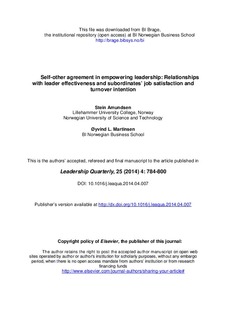Self-other agreement in empowering leadership: Relationships with leader effectiveness and subordinates’ job satisfaction and turnover intention
Journal article, Peer reviewed
Permanent lenke
http://hdl.handle.net/11250/280963Utgivelsesdato
2014Metadata
Vis full innførselSamlinger
- Scientific articles [2181]
Sammendrag
In this paper we discuss key aspects of empowering leadership as a basis for conceptualizing and operationalizing the construct. The conceptualization resulted in eight behavioral manifestations arranged within three influence processes, which were investigated in a sample of 317 subordinates in Study 1. The results supported the validity and reliability of a two-dimensional, 18-item instrument, labeled the Empowering Leadership Scale (ELS). In Study 2 (N = 215) and Study 3 (N = 831) the factor structure of ELS was cross-validated in two independent samples from different work settings. Preliminary concurrent validation in Studies 1 and 2 found that ELS had a positive relationship to several subordinate variables, among others self-leadership and psychological empowerment. In Study 3 ELS was compared with scales measuring leader–member exchange (LMX) and transformational leadership. Discriminant validity was supported, and moreover, ELS showed incremental validity beyond LMX and transformational leadership when predicting psychological empowerment.
Beskrivelse
This is the authors’ accepted, refereed and final manuscript to the article. Publisher’s version available at http://dx.doi.org/10.1016/j.leaqua.2014.04.007
